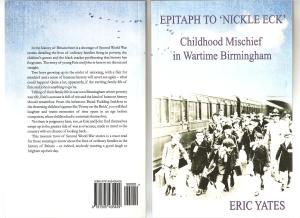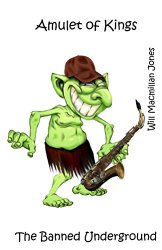Today I’d like to introduce you to the late Eric Yates and his marvelous book:
EPITAPH TO ‘NICKLE ECK’
Childhood Mischief in Wartime Birmingham
By ERIC YATES
Book Description

It is the late 1930’s and, despite his diminutive stature and humble demeanour, from a very young age little Eric (‘Nickle Eck’ to his family) is expected to earn his keep, beginning with the task of collecting and delivering beer for his Dad’s friend – but not before taking a swig and topping up the bottle with tap water – for which he is paid 6d.
‘Nickle Eck’ was accustomed to being surrounded by forests of bottled beer as a toddler, while his Mom played the piano and sang. Even then he returned the empties for 2d – but not before draining a few bottles first. He considered himself ‘the youngest alcoholic in Birmingham’.
From the age of four, Eric sticks doggedly to the side of John, his hero and elder brother by two years, obeying instructions carrying out John’s momentous ‘IDEAS’ which could lead him to suffering bruises, black eyes and similar injuries – even fearing an early death – as well as the inevitable thump on the head from Mom.
John is the instigator of questionable mischief and shenanigans with which the boys fill their days. From pyrotechnics, explosions and electrocutions to the strengthening of neck muscles, bread soup incidents and bob-sledging life is never dull, but the brothers are highly intelligent with great wit and enterprise. Their love of reading develops their minds and their humorous yet heart-stopping escapades often include characters and ideas taken from literature.
Eric and John are evacuated, quickly becoming the despair of billeting officers who move them from one home to another, leaving havoc in their wake. Following a fishing incident, when they inadvertently drain a canal causing serious flooding and find themselves in court, John assumes the mantle of Defending Counsel, thoroughly enjoying this role and confident that his cunning idea to prove their innocence will deflect punishment – which it does, the case being dismissed. However, the brothers are then separated for the first time in their young lives.
Although devastated without John to protect him, Eric stoically does his best to stave off the teasing and brutality of other evacuees and, admittedly terror-struck, uses his inborn talent and humour to win round his tormentors who appoint him the gang’s jester – which is a role that Eric plays throughout his lifetime.
Check out the the Amazon.co.uk book website, where the reviews are very enthusiastic.
ERIC YATES (1933-2012)
Eric did two years’ National Service as an Army Education Officer in Cyprus, and seven years with the Kenyan Police in East Africa where, as a Customs & Excise Investigation Officer, he swam in shark-infested waters looking for hidden contraband. Whilst living in Africa, he joined the National Theatre of Nairobi where he performed in Shakespeare, the Classics and drama.
For almost 20 years he worked for Bass Charrington, controlling licensed premises throughout the Midlands, and also for Mitchells & Butlers in Birmingham, (U.K) during which time he was with the Hall Green Little Theatre and became a stalwart member of the Blossomfield Club in Solihull, where for many years he performed, directed and was co-writer of original musical comedies produced and performed there.
At one time a presenter for BBC Radio Birmingham, Eric spent ten years with the Monitoring Section of the BBC World Service in Berkshire, becoming well-known locally for his acting talent, especially mimicry and humour, winning numerous awards over the years.
Eric was married twice and met his second wife in Henley-on-Thames, when she directed him in J.B. Priestley’s When We Are Married. At that time he was semi-retired working as a warden at Windsor Castle, where he endeared himself to his colleagues but was often reprimanded for displaying his unique brand of humour to the general public.
Retiring to Devon in 2001, Eric enjoyed boat restoration, brewing very strong cider, cultivating rare trees and plants and reading. He began writing his stories in 2004 – and also began tales from his adult life, regrettably unfinished. He and his wife performed in Salcombe, where he is celebrated in the South Hams for his performance in the famous music hall sketch ‘Dinner for One’ (YouTube – Dinner for One, Eric).
His final memorable performance was at the 2011 Dartmouth Drama Festival, five months before he died, where he brought the house down in the two miming sketches from Michael Frayn’s Alarms & Excursions, directed by his wife. His expertise was as sharp as ever and, as always, he received tumultuous applause.
REVIEW by Amazon Kindle publisher (Sept. 2014)
EPITAPH TO ‘NICKLE ECK’
Childhood Mischief in Wartime Birmingham
By ERIC YATES 
This is an excellent book. It depicts a very colourful and vibrant snapshot of Eric and John’s formative years in war-torn Birmingham. The book is highly entertaining from beginning to end and I challenge anyone to read it without raising a smile. EPITAPH to ‘NICKLE ECK’ is somewhat short in length but it is still one of the most compelling books I’ve read in a long time – there is so much that is worthy of praise. However, the heart of the work lies with Eric and John and their wit, their infinite sense of adventure and their sheer love of challenging the boundaries. This is a really refreshing read which, I am certain, will strike a chord with all those who are fortunate enough to read it.
Eric’s expertise at recounting their boyhood antics is second to none. His articulate way with words, his wide-ranging vocabulary and his excellent use of description makes this book a pleasure to read. The style is also wonderfully warm and endlessly entertaining. His vivid descriptions of characters, settings and events are first-rate and he is something of an expert at bringing things to life. Not only was Eric a natural storyteller but he was also a natural comic, too, and EPITAPH to ‘NICKLE ECK’ makes full use of these special gifts.

The way that Eric describes the characters in the book is superb. As a reader, one has no problem in imagining what Mom looks like or Grandad or Chopper Smith because Eric picks out a handful of their most prominent traits and describes a couple of their physical attributes, and that’s really all it takes. The result is perfection. My favourite two descriptions have to be (for their comic value alone) The Babby, Fred, the 12lb baby who could be found ‘sleeping off several pints of full-cream milk’ and Chopper Smith – ‘It wasn’t just his ape-like gait which frightened us, or his sagging features – of which he had many – but his habit of carrying a chopper.’
The content of this book is what makes it stand out from any others in this field. The mischief and shenanigans that these two boys filled their days with make for excellent reading. Although, I must side with Eric for a moment because it is clear that John was almost always the instigator of these questionable activities. From pyrotechnics, explosions and electrocutions to the strengthening of neck muscles, bread soup incidents and bob-sledging, there are so many laugh-out-loud moments in this book that one simply can’t read it with a straight face. The Cowboys
and Indians game which nearly resulted in the demise of the Potato Man is particularly hilarious and the visual imagery which is evoked from the writing is splendid. The boys must have been very popular with the fire brigade.
Aside from the light-hearted fun, there are also some serious parts to the book, the most poignant of which is the ‘Evacuees’ chapter. Eric must have been scared – as he admits – when he and John were evacuated to Nottingham because he recounts the sights, sounds, smells and atmosphere at the railway station in great detail. Moving away from home – even with his brother – must have been a very scary time for both of the boys and, indeed, all evacuees, and Eric captures this anxiety very well. It wasn’t long, however, until their shenanigans started up again and before long they became familiar faces at the Billeting Office because they had to keep moving from one house and family to another. As well as the evacuee story, there are two more touching additions to the book – the ‘Ode to My Brother’ and the ‘Epitaph’. Both pieces of writing demonstrate the skills of each author brilliantly but, most importantly, they also speak volumes about the close relationship between these two brothers that obviously spanned their lifetimes.
Overall, EPITAPH to ‘NICKLE ECK’ is filled with excellent anecdotes which are shared with great wit, fun and entertainment. It’s a winning mix of hilarity, fond memories and colourful characters. In short, it’s a very satisfying and memorable read.





![Pageflex Persona [document: PRS0000030_00042]](https://writerchristophfischer.files.wordpress.com/2016/04/punkrocker_fullcvr.jpg?w=408&h=302)































